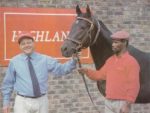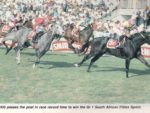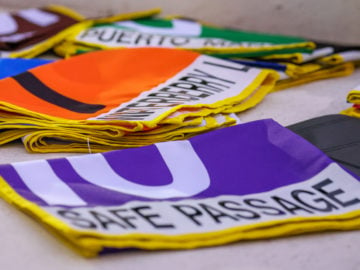March 27 – April 2
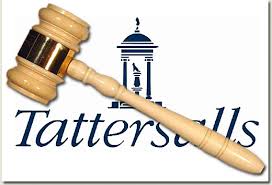 UK Sales company Tattersall changes its catalogue format. The new style is hardly radical, as it merely bring the company in line with the format used by most other sales companies in the world (including the TBA). The change of format is seen as a loss those by those who favour truth over selective truth: the old Tattersall catalogues listed progeny in order of year of birth, and not selectively in order of “black type” merit as has become the norm today. Tattersall admits it has lost horses in the past because of its catalogue’s style. Says MD Andrew Howland: “In terms of commercial reality, it is a change that makes sense”. It is a sentiment with which leading yearling consigners concur. “No product is perfect”, says Ted Voute of Littleton Stud, “but no manufacturer should be expected to emphasise what is least attractive about its creation. To highlight good things in a pedigree must surely make sense”.
UK Sales company Tattersall changes its catalogue format. The new style is hardly radical, as it merely bring the company in line with the format used by most other sales companies in the world (including the TBA). The change of format is seen as a loss those by those who favour truth over selective truth: the old Tattersall catalogues listed progeny in order of year of birth, and not selectively in order of “black type” merit as has become the norm today. Tattersall admits it has lost horses in the past because of its catalogue’s style. Says MD Andrew Howland: “In terms of commercial reality, it is a change that makes sense”. It is a sentiment with which leading yearling consigners concur. “No product is perfect”, says Ted Voute of Littleton Stud, “but no manufacturer should be expected to emphasise what is least attractive about its creation. To highlight good things in a pedigree must surely make sense”.
British Bloodstock Agency (BBA) chairman Philipson disagrees. “A conscientious purchaser, when doing the that part of his homework that is based on catalogue details, needs to know as much relevant information as he can before assessing the potential of a yearling or foal. One of the most relevant pieces of information is the full breeding record of the dam of the yearling or foal. If a mare has produced, say, six foals of racing age and only one winner, the purchaser needs to form an opinion as to why she falls into the category of being a disappointing producer. It may well be that she was mated to stallions that at the time looked promising, but who with hindsight turned out to be disasters. Or it simply may be that she produces poor racehorses more often than good ones. Whatever the answer, the details required to make the judgement should be in the catalogue. It seems to me a retrograde step to sacrifice what has been the most informative pedigree style anywhere, in order to fall in line with less revealing details incorporated in other international catalogues”.
April 3 – 9
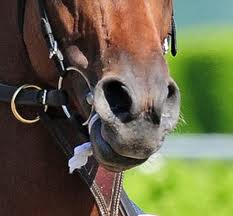
Tongue tie
In Chicago, routine spotchecks of tongue-ties (cloth bands, or pantihose, used to tie a horse’s tongue in order to prevent the tongue from obstructing the airflow) reveal traces of cocaine in some 32 horses. As a result, the Illinois Racing Board orders mandatory pre-race saliva tests for all horses at Illinois tests. Several horses are suspended and trainers fined in an effort to prevent snorting horses from performing a cut above the rest.
An equine influenza, which first struck least year, leaves 30.000 horses dead and 1.5 million seriously ill in China’s northern and western provinces, at least according to the official Chinese daily newspaper. The newspaper states that the disease has failed to be controlled despite the prompt action of local governments.
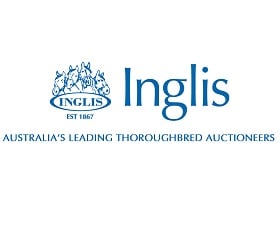
Sydney Easter Sale
An outbreak of suspected botulism at the Sydney Easter Yearling Sale causes the death of more than thirty valuable youngsters. This tragedy aside, the sale is a spectacular success, with an average of A$71.000 for 385 yearlings sold, the second highest average ever after the sale of ’89. “But”, says sales director Reg Inglis, “this was real money. In those terms this was our most successful sale ever”. Top lot, at $375.000, is a Marscay – Research filly. The sale is attended by Arab buyers, eight of Hong Kong’s twenty-three trainers, as well as several syndicates and buying groups. One such group, Domeland Pty Ltd, spends out $1.5 million for 15 lots, all of which will undergo their early preparation at an Australian property purchased by the Macau-based group. But leading buyers at the sale are chicken magnates Bob and Jack Ingham, who lay(!) out an awesome $2.6 million on 24 yearlings. South African buyers (who signed for 18 yearlings last year) are conspicuous by their absence, and even Robin Bruss, with three yearlings, is well below levels of previous years.
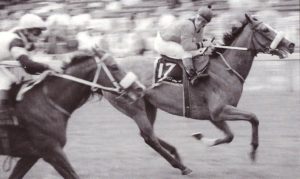
Kundalini wins the Bloodline Classic
Kundalini, purchased two years ago at the Sydney Sale, wins the R500.000 Gr1 Bloodline Classic over 1800m at Gosforth Park. The race is the second leg of the Triple Crown (with Cape Guineas the first and Daily News 2000 the third leg). The daughter of El Gran Senor is allowed to start at 7/1, and runs on nicely to account for Record Edge and Rusty Pelican. Several of the leading contenders, including Crimson Waves (bought into the Futurity part of the race by Graham Beck for R50.000), Imperial Despatch, Star Award and Record Edge, were severely disadvantaged on the tight track by their wide draws. The connections of Record Edge have some consolation, however: their horse is the first Bloodline Futurity candidate home and qualifies for the TBA’s R210.000 bonus.
Kundalini’s Hilda Podlas states after the race that the filly will race for another season before being sent overseas to be covered by a top European or American stallion. “She definitely won’t be covered here”, says Podlas, speaking on behalf of owner Swynford Paddocks.
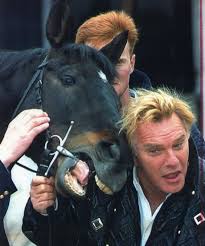
Miinehoma & Freddy Starr
There’s a wholesale gamble in the £116.000 Grand National, by public and professionals alike, on soft ground specialist Master Oats, and many press their luck when the heavens open a day before the race to further soften the track. But trainer Kim Bailey states that the race comes a year too soon for his charge, saying “he’s run only nine times and is still inexperienced”. Kim’s proved right when only six of the 36 starters make the finish – and Master Oats isn’t one of them. The race is won by 16/1 shot Miinnehoma, owned by 49-year-old comedian Freddy Starr, who had backed his horse to win £330.000 when it opened at 33/1 in the betting. “I’m over the moon” says Starr, a father of three. “This is even better than sex” – and Starr’s only 49! Freddie bought Miinehoma as an unbroken 5yo at the Doncaster Spring Sales for 35.000 guineas, the comedian doing the bidding by sticking out his tongue at the auctioneer, raising a laugh as well as the bids. When put into training, Miinnehoma took some time to be persuaded that he was a racehorse – clearly sharing Starr’s eccentricities. He was a nightmare to ride, bucking and kicking, but showed such ability that Starr had a good bet on him when the horse made his racecourse debut, in a bumper. Needless to say he dropped his jockey in the paddock and had to be mounted on the course. Even so, he won by 5 lengths and at 25/1!
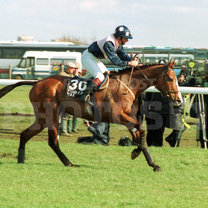
Fiddler’s Pike & Rosemary Henderson
Still with the National, fifth finisher Fiddler’s Pike makes history when he carries 51-year-old grandmother Rosemary Henderson safely over the finish line. Rosemary is the oldest woman to have ridden in the National, and now also the one finishing nearest to the winner since the weaker sex was first allowed to compete 17 years ago. At 13, Fiddler’s Pike is the oldest horse in the race, prompting Ms Henderson to say “He’s virtually past it, and I certainly am”.
April 10 – 16
A jockey’s strike is averted when agreement is reached in principle between interested parties (owners & trainers, Jockey Club, raceclubs, and jockeys) on increases for the silken brigade. Fees seem set to rise from R135 to R163 per ride.
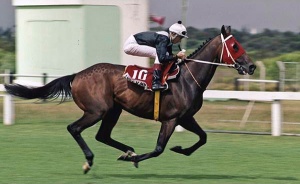
Take A Walk
Seventy-one hopefuls are entered for the Rothmans July, to be run in just under three months time. Largest entry comes from trainer Millard, with eleven. Bookmakers are quick to price up in attempt to fill their satchels. Early favourites are Lord Shirldor and Take a Walk at 10/1, Eli’s Truth, Crown Estate, Dancing Duel, Kundalini, Vesta and Record Edge 14/1, and Pas de Quoi, Imperial Despatch, Sapieha and Flaming Rock at twenties.
Cape trainer Paddy Kruyer has a dream start to his Natal campaign when At The Savoy, neglected at 10/1 in the betting, pips Not Negotiable on the line in the R50.000 Kings Cup at Greyville. The winner, a lightly raced son of Dancing Champ, is said to have the Rothmans July as his winter objective and should strip a better horse than this, come the big day.
April 17 – 23
In Johannesburg a state-of-the-art betting complex opens its doors to the public. The Bruma Sporting Club, in Eastgate, occupies three levels. A group of bookmakers operates the Club, and everything is done to let the punters enjoy their racing in the greatest comfort.
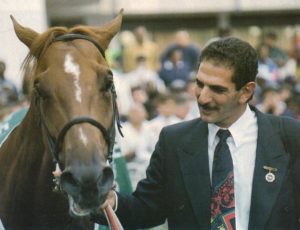
Joe Soma and Special Preview
Australian races should soon be broadcast live to 22 major US casinos. Sky Channel sports TV service eventually hopes to carve 10% out of the $500 million Americans wager on racing in Las Vegas. The casino operation is the first step in what Sky Channel hopes will become a 24-hour global televised racing service. Negotiations are underway to spread the service to Canada, Venezuela, and other Latin American countries, followed by expansion into Asia. Sky Channel has sunk some $5 million into start-up costs. The project has been dubbed “Nags to the World” by the Australian Financial Review.
Juvenile colt Special Preview starts at 8/10 in the Gr2 SA Nursery at Turffontein. The big colt has no problem winning the R150.000 race, some four lengths ahead of Lapswael, Gilded Cage and On The Tiles. Soon afterwards rumours do the rounds about a winner-take-all match race between leading 2yo colts Special Preview and National Emblem. The match is to be staged at Newmarket, over 1200m, with course and connections each likely to put up a third of the proposed R300.000 purse.
April 24 – 30
Shockwaves rip through the racing industry when Gosforth Park Turf Club withdraws from the rationalisation of Highveld racing. Earlier, it had been envisaged that the assets of the three Transvaal raceclubs would be merged into one. Gosforth Park withdraws, according to chairman Barry Walters, because no guarantees are forthcoming from the Transvaaal province that the Development Fund would fall under the effective control of the racecourses, rather than be controlled by the Provincial authorities.
Question is, where does this leave prematurely appointed “one-club CEO” Dr Ray Greenland? And how many punters does it take to foot the bill for his appointment?
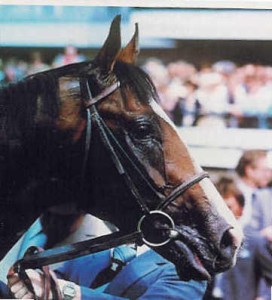
Shergar
In the UK, shareholders in the stallion Shergar (stolen in 1983 and never traced) fail in their bid to claim £200.000 in damages against Lloyds. The claim, filed by trainer Vincent O’Brien and other joint-owners of Coolmore Stud, is rejected in the High Court. Lloyds had refused to pay out because Shergar had been covered only against death, not theft.
Oakfields Thoroughbreds and Leisure Industries publishes its first financial report since last August’s R6.5 million takeover by Paul Spier, the group chairman. Spier is a Dutch citizen resident in Switzerland, and operates through the Eire-based company Turf Accountants. Oakfields, originally Cape based but now operating from an HQ in upmarket Sandton, posts a R1.53 million loss in the half year to end January 1994, with recorded sales of just over a million. Spier notes that the period from August to January is traditionally the low ebb of the racing calendar, resulting in minimal stakes earned during the period under review. Looking ahead, it seems apparent that shareholders will have to exercise patience before the true worth of Oakfields can be gauged, particularly that of the group’s latest acquisition, Swynford Paddocks. Spier reports that the acquisition of the studfarm will see the group embark on a programme to re-establish breeding stock, but cautions that it will take four years for the studfarm efforts to contribute meaningfully to the company’s results (the “old” Swynford, with several stallions and many in-foal mares, foals and yearlings apparently isn’t a going concern as a studfarm… ). Meanwhile, the group’s racing stock has won a number of premier races, points out Spier. “This has placed Swynford Paddocks as the leading owner in terms of stakes earnings on the Jockey Club list at the end of March”. Things must be looking up.
South Africa’s first multi-racial elections cause planned racemeetings to be cancelled and/or postponed. Then on the first racemeeting after the election, at Clairwood, the horse New Regime is backed to clear favourite. Best bet of the day? Not quite, for New Regime finishes unplaced.
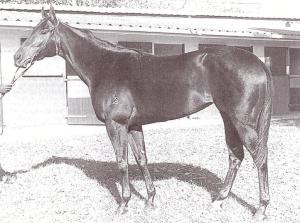
Tracy’s Element
Our best Election result: at last an end to all those meaningless, catalogue-confusing Administrator’s Cups, Administrator’s Championships, Administrator’s Stakes, Administrator’s Handicaps, etc. Mind you, knowing all too well how the brown-worker’s brains perform, the names of these races will probably simply be changed to President’s Cup, President’s Championship, President’s Stakes, President’s Handicap, ….(or for President read Premier – now there’s a sponsor for you!).
Australian import Tracy’s Element hangs on by a head after making an early dash for it in the Gr1 Star Sprint, run over 1200m at Turffontein. Moira Hinton’s three-year-old Last Tycoon filly is in receipt of just 1.5 kilos from the topweighted horse in this handicap race and can now safely stake her claim as the best sprint filly in the country. Three-year-old colt Prince of War finishes second, with his year-older half brother Golden Man in third place.
‹ Previous
